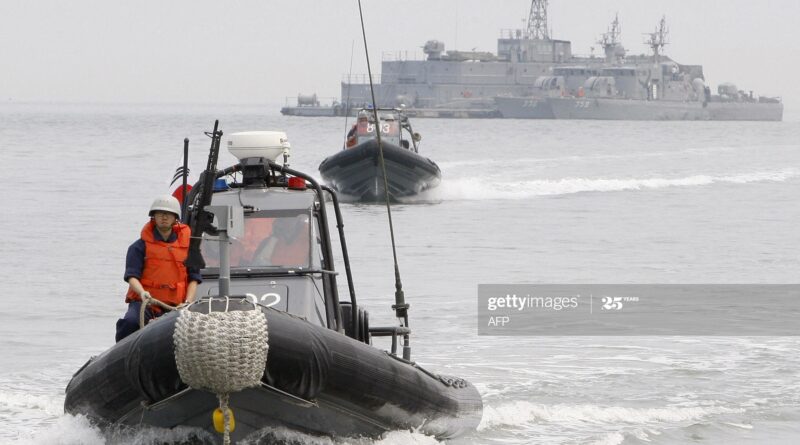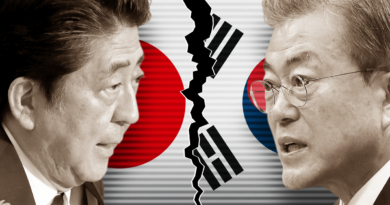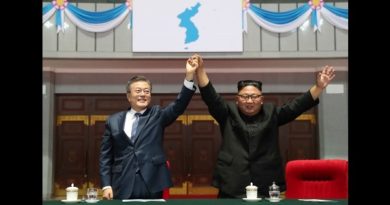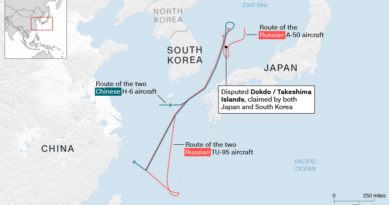DPRK Kills ROK Official
On Tuesday, 22 September the DPRK killed a ROK official found in its territorial waters. The timeline is still unclear, but it appears the ROK fisheries official went missing just after midnight on Tuesday. Then, a DPRK high-speed boat crew discovered the official near Yeonpyeong Island in the afternoon. The boat crew then called in the discovery and, after receiving orders from leadership, shot the man on Tuesday night before setting his body on fire. Understandably, this has caused outrage in the ROK over the failing of government officials to notice the man was missing and prevent his death.
Moon Called for End of War Declaration
As the news of this heinous act was breaking, Moon Jae In’s speech at the UN General Assembly was airing. Moon called for an end of war declaration, claiming it would precipitate denuclearization and a “lasting peace” on the peninsula. Further, Moon called for inter-Korean medical cooperation, a nod to his government’s proposal to make South Korean doctors “healthcare assets,” in a bid to force them to provide treatment in the North.
This speech was pre-recorded and released prior to Moon being informed of the events that took place near the NLL. However, this underlines the risk Moon has taken on by accepting the DPRK’s belligerent actions. The Moon Administration has launched investigations into DPRK defector groups after the Kim regime ratcheted up its anti-defector rhetoric. Further, Moon’s allies have disparaged defectors in the ROK National Assembly in response to the DPRK’s complaints. Meanwhile, the DPRK blew up the inter-Korean liaison building in Kaesong, opened fire on a ROK guardpost at the DMZ, and consistently used insulting language to refer to the President of the ROK.
Reaction to the Killing
Following the news, the ROKG called on the DPRK to thoroughly investigate the incident. This pronouncement came on the heels of a back-handed apology from Kim Jong Un over the shooting. In the apology, Kim indicated that he was sorry for giving a “big disappointment” to Moon, and that the DPRK should have helped the ROK in its struggle with the coronavirus, rather than killing the official. Moreover, the DPRK’s account of events differed from the ROK’s account of events. According to the ROK, the fisheries official was attempting to defect to the DPRK when he was killed by the KPA Navy and set on fire. According to the DPRK, the official made no mention of defection and was killed after attempting to “run away” from responding troops. Afterwards, his body was unable to be located and his “flotation device” was set on fire, in accordance with COVID-19 prevention protocols.
On Monday, 28 September Moon finally issued an apology to ROK citizens for his government’s mishandling of the situation. However, in the apology Moon also indicated that Kim’s statement showed the DPRK’s willingness to put the incident behind them and move forward in peace. Consequently, Moon hoped to use the death of a ROK official as an “opportunity to develop South-North relations.” Yet, Moon still has not called for any DPRK official to be held accountable for the killing of one of his fellow countrymen.
According to reporting from DailyNK, KPA Navy Unit 587 was responsible for the killing of the ROK official and was set to receive a commendation for the action signed by Kim Jong Un. According to KPA sources quoted in the report, higher command directly praised the team and it’s commanding officer for their “hard work.” Moreover, this unit is part of the echelon responsible for the events that led to the Battle of Yeonpyeongdo in 1999 and the Second Battle of Yeonpyeongdo in 2002, whereby DPRK vessels attacked ROK vessels after crossing the NLL.
Conclusion
The DPRK likely killed the ROK official in accordance with COVID-19 orders, which call on border troops to shoot anybody entering the country. Moreover, that the DPRK would kill a ROK national after identifying that he was a ROK national indicates that it did not expect any repercussions. Accordingly, the Moon Administration did not, in fact, place any pressure on the DPRK. In fact, as mentioned above, the Moon government indicated its hope to use this event as a catalyst for inter-Korean dialogue. This will further incentivize the DPRK to conduct small-scale acts of violence to gain concessions in negotiations with the South. Moon has demonstrated his government’s total investment in dialogue with the North at any costs. US decision makers must keep this in mind when formulating policy with respect to the Korean Peninsula.




